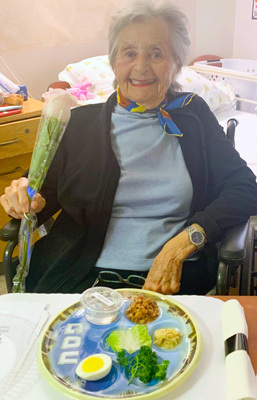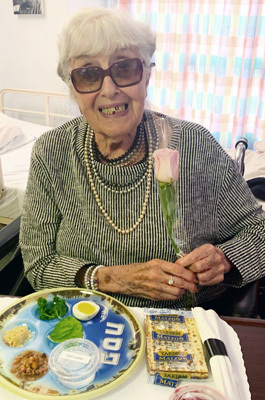Los Angeles Jewish Home Residents Contemplate the Meaning of Passover After an Unprecedented Year


Los Angeles Jewish Home Residents Contemplate the Meaning of Passover After an Unprecedented Year
Spring is upon us, bringing flowers in bloom, longer days of sunshine, and fresh optimism and hope to the Los Angeles Jewish Home. This year, the end of winter coincides with a cautious hope around the gradual tapering off of the COVID-19 pandemic—coming at a powerful time as we prepare to welcome Passover, a holiday that celebrates themes of liberation.

Passover has always been a special time at the Los Angeles Jewish Home, dating back to the organization's beginning more than a century ago. In 1912, a small group of caring neighbors gave shelter to five homeless Jewish men at Passover, and the Jewish Home was born. Local grocer Simon Lewis, one of the Home's founders, was haunted by the "forlorn old people without family, friends, or shelter standing within our gates, pleading for our assistance." The Jewish Home was a refuge where these seniors could find critical support.
Lewis and his fellow co-founders could scarcely have dreamed what the Jewish Home would one day become: one of the nation's preeminent providers of senior care, serving 4,000 men and women annually. From its humble origins, the Jewish Home has grown into a recognized leader in programs and services designed to ensure elderly Americans' robust physical and emotional health.
This Passover, the Jewish Home is beginning to experience a slow and safe reopening of its vibrant residential life. As they contemplate the unprecedented year just passed, Jewish Home residents see key parallels with the holiday and its deeper meaning for how we live our lives.
"The pandemic has been challenging, but I am very grateful," says Connie Robin, a resident at Fountainview at Gonda Westside and chair of the facility's Jewish Life Committee. "I feel blessed to live in a country where I'm free to live Jewishly. I'm also grateful to be living at Fountainview at Gonda Westside during this time. Had I been in my own home during COVID, I would have been very lonely."
Eisenberg Village resident Joy Snyder acknowledges the difficulties presented by the pandemic, but says Passover is a perfect time to gain some perspective. "There is always hope in life, even if sometimes it is a little slow in coming," she says. Just as the ancient Israelites needed to bide their time to escape Egyptian slavery, so, too do we need to have a little patience as we wait for our current predicament to pass. "It can be a struggle, but we need to roll with the punches and try to keep our psyches up and a smile on our faces," Joy says.

For Joy's fellow resident Harriet Rosenberg, the holiday is an opportunity to anticipate what life will be like once the coronavirus is finally behind us. "To me, Passover is a time for being with family," she says. "As much as the Jewish Home does to help everyone celebrate the holiday, I look forward to being with my family again!"
Doris Gould, who lives in the Joyce Eisenberg-Keefer (JEK) Medical Center on the Jewish Home's Grancell Village campus, concurs. "Passover means getting together with friends and family, celebrating freedom and being able to sing with joy," she says. As the pandemic begins to recede from view, she is eager to add her voice to a triumphant chorus of loved ones sharing food and laughter at the same holiday table.
Another JEK resident, Shirley Landau, is channeling her Passover energy into practical prayers that echo the holiday's narrative of a partnership between God and man. It takes Moses and the Israelites to put God's Exodus plan into motion—a collaboration that results in eventual success. "I used to pray for God to take away the pandemic," Shirley says. "Then I switched to asking God to give man the brains to create a shot to make us safe. That's God's way of doing it."
The prayers seem to be paying off. "I got both shots!" says Shirley, who—like 99 percent of all eligible residents at the Jewish Home—benefited from the Home's rapid vaccine rollout.
For Shirley and her fellow residents at the Jewish Home, this year Passover is coming at the right time, as we celebrate liberation in its many forms.